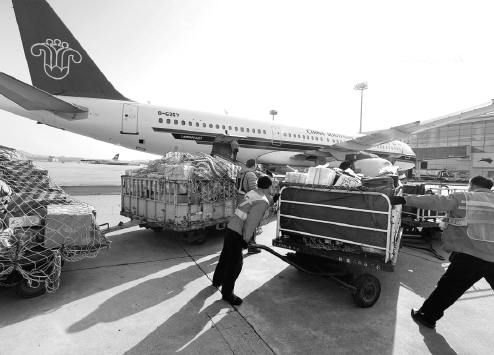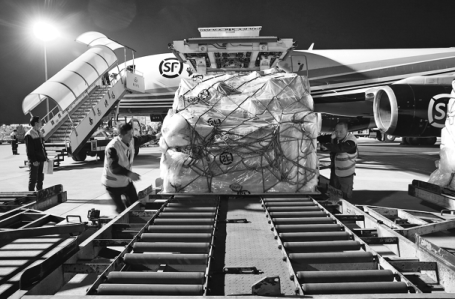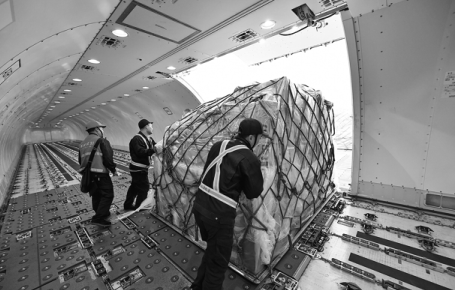Air cargo market gets big boost from corporate giants
Major players investing in larger fleets, route networks, stronger infrastructure and service support

China's air cargo industry is undergoing a shake-up as major players, driven by growing market potential, seek to strengthen their positions.
Corporate giants at home and abroad are injecting capital and confidence into the Chinese air cargo field with larger fleets, more complete route networks and stronger infrastructure and service support.
On Dec 24, 2019, China Southern Air Holding Co Ltd launched an air cargo company as a new business entity to further tap the market. With a registered capital of 1 billion yuan ($144 million), the new company is registered in Guangzhou, South China's Guangdong province.
CSAH is the parent company of China Southern Airlines Co Ltd, China's largest air carrier with a fleet of more than 860 aircraft.
The move is aimed at consolidating its position in the air cargo market with services throughout the air cargo industry chain.
On Dec 31, SF Airlines announced its all-cargo freighter fleet had reached 58 on its 10th anniversary. The Shenzhen-based airline has become China's largest air cargo airline and has created a global air cargo service network with 65 destinations.
This year, the all-cargo freighter fleet of SF Airlines is expected to exceed 60, with more than 70 global destinations.
"Chinese enterprises are constantly optimizing their global industrial distribution and strengthening their global performance. Meanwhile, Chinese customers have shown their great cross-border consumption capacity," said Liddel Li, president of SF Airlines.
"All these factors foster our sustainable growth and confidence in the Chinese air cargo market."
SF Airlines has evolved into a medium-sized cargo airline over the past 10 years, a golden decade for China's express delivery and civil aviation industries.
China's express delivery industry has become the world's fastest-growing and most dynamic emerging post and delivery market. The volume of China's express packages has exceeded the total sum of the United States, Japan and Europe.
The civil aviation industry is also a highly sensitive barometer of the economy. China's civil aviation market has generally maintained growth momentum, and the air cargo sector is particularly impressive.
Airports are the most important infrastructure sustaining the development of the air cargo and air passenger transport sectors.
Thanks to the country's sustainable economic growth and persistent support, China's civil airport sector has achieved high-speed and high-quality development in the past decade, according to Zhang Rui, deputy director-general of the airport department of the Civil Aviation Administration of China.
From 2009 to 2019, the number of China's certified civil airports increased from 158 to 238 and eight airports advanced into the world's Top 50 airports.
In the same period, the cargo throughput of China's civil airports increased from 8.83 million metric tons to 16.74 million tons.
"The enhanced air cargo capacity is a highlight in the new round of airport renovation and construction," said Zhu Qianhong, general manager of the Guangdong Airport Authority.
In newly approved airport construction plans by the CAAC, the designed annual collective cargo capacity of Kunming, Yunnan province, Xiamen, Fujian province, and Chongqing airports will exceed 1 million tons.
The newly opened Beijing Daxing International Airport is expected to handle more than 2 million tons of air cargo by 2025. And major air hubs in Shanghai and Guangzhou will also gain increased air cargo throughput capacity.
SF Express has also invested heavily in constructing an international logistics hub in E'zhou, Central China's Hubei province. With a cargo-focused airport in the hub, the Chinese express delivery giant will strengthen its worldwide air express delivery system.
"Intensive moves of corporate giants in the Chinese air cargo market are driven by market potential. China's huge consumption market and unleashed spending power will drive the air cargo industry into a new round of development," Zhu said.
In October 2019, Guangzhou Aircraft Maintenance Engineering Co Ltd, or GAMECO, and Boeing announced a plan to launch a 737-800 Boeing Converted Freighter production line at GAMECO's Guangzhou Baiyun International Airport hangar.
China's rapidly growing e-commerce and express delivery market will make air cargo a key growth driver. Over the next 20 years, the Chinese market is expected to have demand for 230 new freighters and 500 converted freighters, said Boeing's latest market forecast.
"Air France-KLM Cargo greatly values the potential of China's air cargo market. We will continue to consolidate a foothold in the market through a prudent and judicious approach," said Rahul Pathak, head of Air France-KLM Cargo China.
"There is no other better place in the world than China where digital content and usage are embraced and welcomed. We have provided Chinese customers with a suite of 365-day, round-the-clock services on the digital platforms," he said.
Moreover, the airline has recently introduced a data platform specially designed for small-and medium-sized enterprises, enabling them to stay responsive to market changes swiftly and flexibly.
"China's air cargo market is embracing greater opportunities and challenges alongside the advance of the Belt and Road Initiative and higher demands in the global logistics system from all sectors," Li of SF Airlines said.
"It is a major opportunity for our domestic enterprises and also new business chances for global peers."
The writer is a reporter with Xinhua News Agency.



Today's Top News
- Sanya rises as magnet for Russian tourists
- China's steady opening-up for Asia-Pacific economic growth
- Blueprint seen as a boon for entire world
- 'Kill line' an inevitable outcome of US system
- Fusion energy drive entering a decisive phase
- Trump threatens 10% tariffs on 8 NATO allies





























